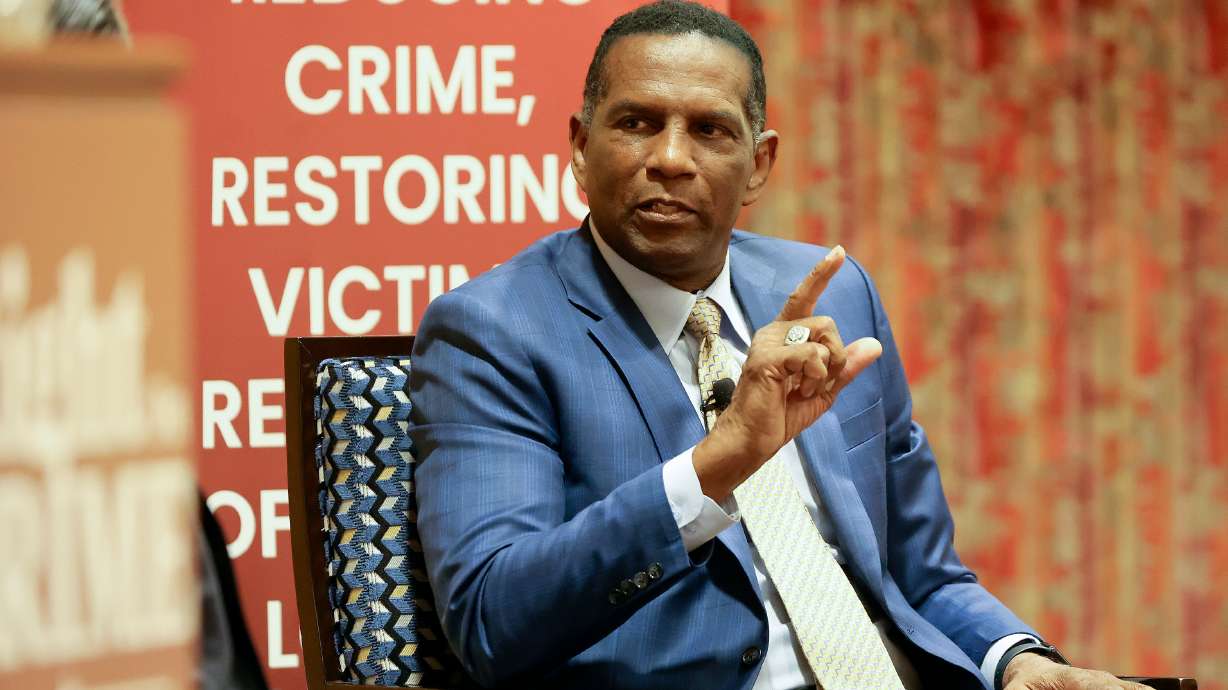Estimated read time: 5-6 minutes
This archived news story is available only for your personal, non-commercial use. Information in the story may be outdated or superseded by additional information. Reading or replaying the story in its archived form does not constitute a republication of the story.
WASHINGTON — During a Thursday morning House hearing, Rep. Burgess Owens, R-Utah, described diversity, equity and inclusion programs as "a long-growing cancer that resides in the hearts of American academic institutions."
The hearing, titled "Divisive, Excessive, Ineffective: The Real Impact of DEI on College Campuses," was led by Owens, chairman of the House Subcommittee on Higher Education and Workforce Development. It touched on the impact of diversity, equity and inclusion programs on medical institutions and antisemitism on college campuses.
Owens in his opening remarks said these programs create a "jaded view" of America, where American society is viewed "as a pyramid composed of race oppressors and race oppressed."
This congressional hearing comes not long after the Utah Legislature's decision to overhaul diversity, equity and inclusion programs in public institutions, including universities, schools and other state entities.
The new law, signed by Utah Gov. Spencer Cox on Jan. 30, also requires university employees to undergo training on the value of free speech and conduct climate surveys, the results of which need to be shared with lawmakers. The state can withhold funding if institutions violate any of the requirements.
At the congressional hearing in Washington, Owens, who represents Utah's 4th District, said, "(Diversity, equity and inclusion) bureaucrats are hired not only to control conversations but also to stifle free speech and open discourse by asserting leverage on every part of university management, personnel, curriculum policy and college admissions."
Republicans and Democrats clash over the program's point
Owens said it teaches Black Americans to perceive their race as "weak" and to "wait for the promise of slavery reparation." Owens added diversity, equity and inclusion programs also tell Black Americans, like himself, "who muster the tenacity and grit to succeed, are the exception, not the rule."
"(Diversity, equity and inclusion) is both demeaning and racist," Owens said, pointing to the cancellation of scholars who dare to question it.
Owens laid out the cost of diversity, equity and inclusion programs across the country: $30 million a year at the University of Michigan, $20 million at Ohio State, $16 million at the University of Western Wisconsin, and $11 million at Texas A&M.
"What is the result?" Owens asked. "More hatred? More anger? And more racism?"
Ranking chairwoman Suzanne Bonamici, D-Ore., pushed back on Owens' comparison of diversity, equity and inclusion programs to cancer, which, she said, was "baffling and pretty offensive to anyone who's had cancer." To this, Owens said he was a cancer survivor and stuck by his original remark.
Bonamici said diversity, equity and inclusion offices aim to help support and identify hurdles in the education system to meet "the needs of increasingly diverse populations, many of whom are first-generation college students."
"Regrettably, some Republican-led state legislatures have decided that (diversity, equity and inclusion) offices are too costly," she said.
Bonamici said colleges where diversity, equity and inclusion programs aren't living up to expectations should be challenged to foster improvement, instead of being condemned completely.
The role of diversity, equity and inclusion programs in medical school
Before he began questioning the witnesses, Owens said he read an article about Columbia University receiving backlash for a viral 2021 video where students recited an altered version of the Hippocratic oath during a white coat ceremony.
It included statements like "We also recognize the acts and systems of oppression effected in the name of medicine," and "We take this oath of service to begin building a future grounded in truth, restoration, and equity to fulfill medicine's capacity to liberate."
Owens asked witness Dr. Stanley Goldfarb, the chairman of Do No Harm, a medical association combating liberal ideology, whether the original oath mentions "systems of oppressed in medicine." Goldfard responded the original did not include any such statements. When Owens asked whether the role of medicine is to liberate, Goldfard, again, responded "no."
"Physicians must keep a lot of information in their heads, sort through it, understand human variability, and be able to apply it to that individual patient," said Goldfard. "And that's why I feel so strongly that it's academic achievement that ought to be the basis for acceptance into medical school."
"I think we'd all agree that this is one profession where meritocracy should be the primary focus," Owens said.
Diversity, equity and inclusion programs and antisemitism on college campuses
Owens directed his next question to Jay Greene, a senior research fellow at The Heritage Foundation's Center for Education Policy, about the impact of diversity, equity and inclusion programs on the Jewish community.
Greene, in his opening statement, said instances of antisemitism on college campuses aren't isolated. In his analysis of X accounts of university diversity, equity and inclusion staff, Green found evidence of "vehement hostility toward" Israel. He stated these staffers posted "three times as often about Israel as they do about China." The language used to display this disdain touches on terms like "apartheid, colonialism, genocide and ethnic cleansing."
Owens moved on to witness Erec Smith, an associate professor of rhetoric at York College of Pennsylvania and a CATO research fellow, asking him to expand on his statements about diversity, equity and inclusion programs being "silently anti-Black," and how he was labeled a "white supremacist" for arguing against these programs as a Black academic.
In his opening statement, Smith said prescriptive racism, which projects "certain values, attitudes and behaviors onto someone based on their race," is a part of social justice reform.
He noted instances of professors allowing and encouraging Black students to write in African American vernacular, also known as Ebonics. When students refused to stop using standardized English, these professors saw it "as a form of self-hatred and internalized racism," Smith said.
"It is not inherently racist to teach standardized English," he told Owens.










